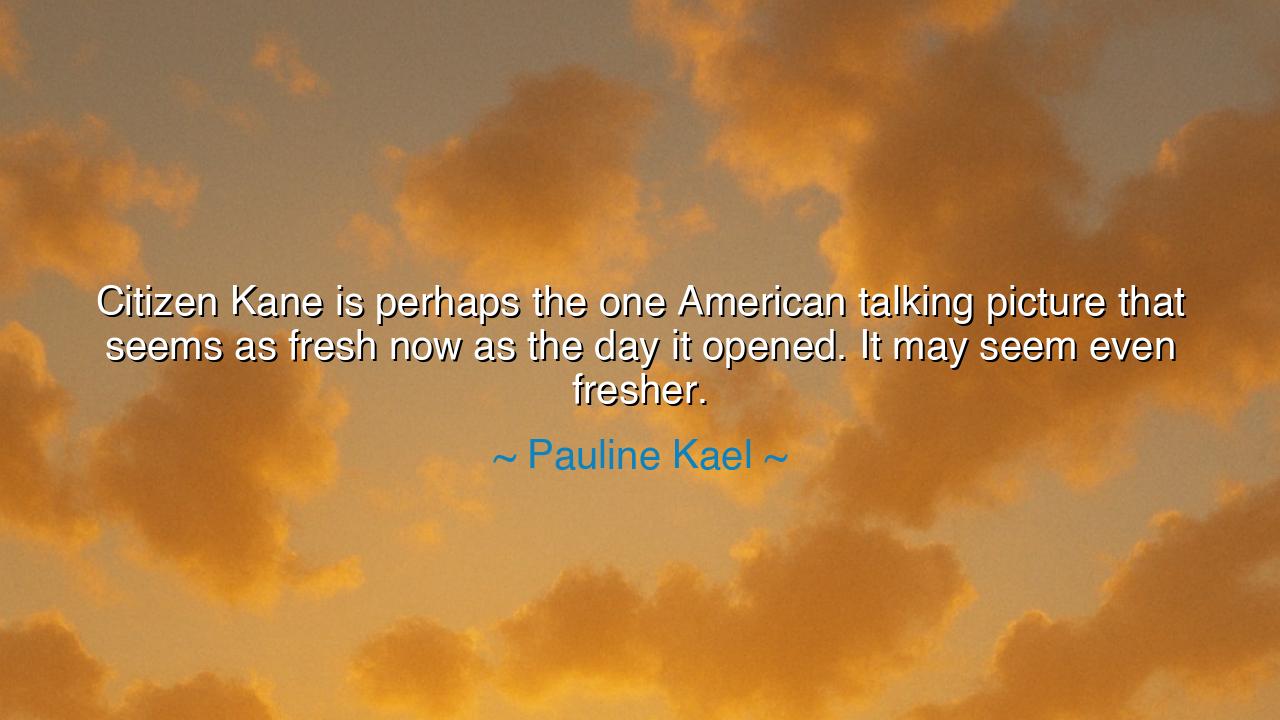
Citizen Kane is perhaps the one American talking picture that
Citizen Kane is perhaps the one American talking picture that seems as fresh now as the day it opened. It may seem even fresher.






When Pauline Kael declared, “Citizen Kane is perhaps the one American talking picture that seems as fresh now as the day it opened. It may seem even fresher,” she was not offering idle praise, but naming a phenomenon that belongs only to the highest reaches of art: the ability to transcend time. In her words we hear the recognition that true creation does not wither with the years, nor does it fade into dust like the fashions of its age. Instead, it breathes anew for each generation, its vitality undimmed, its truth unbroken. To call Citizen Kane “fresh” decades after its release is to proclaim it not merely a film, but a living work of art, a mirror that reflects humanity endlessly.
The origin of this truth lies in the nature of Orson Welles’s masterpiece itself. When Citizen Kane appeared in 1941, it confounded the conventions of cinema: its fractured storytelling, its deep focus photography, its daring use of light and shadow, its portrayal of ambition and loneliness. Many expected it to age quickly, like an experiment too tied to its moment. And yet, as Kael observes, it has not aged—it has grown. The struggles of power, corruption, isolation, and longing it portrays are not bound to one decade, but echo eternally in the human condition.
History provides us with echoes of this phenomenon in other arts. Consider Homer’s epics, spoken aloud nearly three thousand years ago. They too were tied to their time, filled with the customs of warriors and kings. Yet even today, they are “fresh,” for they speak of wrath, loyalty, love, and fate—things no age can exhaust. Or consider Shakespeare, whose plays were staged before Elizabethan audiences yet still strike modern hearts with lightning force. This is what Kael recognized in Citizen Kane: that some works are born not only for their time, but for all time.
The meaning of Kael’s words is also a reminder of the difference between novelty and greatness. Countless films, when they are first released, seem dazzling, new, even revolutionary. Yet in time, many grow stale, their tricks exposed, their relevance diminished. Citizen Kane, however, grows fresher with age because its innovations are not mere tricks—they are rooted in deep truth. Its story of Charles Foster Kane, the titan undone by emptiness, is a parable for every age. Each new generation sees itself reflected in his rise and fall, and thus the film continues to breathe, renewed by the gaze of new eyes.
The lesson for us is profound: true art, true work, is not about impressing the present moment, but about reaching into the eternal. When you create, do not ask, Will this please today? Ask instead, Will this still speak tomorrow? Do not measure your work only by applause, but by whether it touches truths so deep they will not wither. For what is tied too closely to its moment will fade with it, but what is rooted in eternal themes will grow fresher with time, as Kael so powerfully observed.
What, then, should you do? First, seek out works that remain fresh across the years, and learn from them—whether in film, literature, or art. Second, when you create, aim to speak to the heart of humanity, not merely to the fashions of your age. Third, cultivate patience, for greatness is often recognized not in its first moment, but in the long unfolding of years. Citizen Kane itself was not an immediate box office triumph, but time revealed its power.
Thus, let Pauline Kael’s words stand as a teaching: “It may seem even fresher.” This is the true mark of greatness—that the passage of time does not erode it, but polishes it, until its truth gleams even brighter. And the wisdom we must carry is this: whatever we do, let us strive not merely to dazzle, but to endure, for only in endurance does art, and life, reveal its true majesty.






AAdministratorAdministrator
Welcome, honored guests. Please leave a comment, we will respond soon